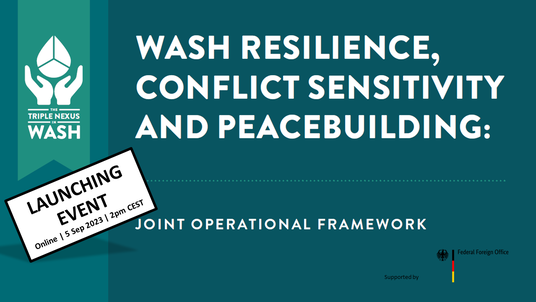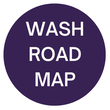initiative 7: Humanitarian Development Peace Nexus Framework
resilient and sustainable WASH services for all, always, everywhere
Despite adhering to a host of common principles, humanitarian and development actors are not aligned in the planning, design and implementation in the WASH sector, whereas peace is more often not considered. Iver time, humanitarian crisis have become more frequent, effecting more people and lasting longer. This necessitates close collaboration and coordination between humanitarian and development actors in order to address needs in protracted crises settings and lay solid grounds for advancing the SDGs post crises.
It’s against that backdrop that a WASH collective outcome[1] is expected from the Humanitarian, Development and Peace actors to:
To reach this goal, this initiative was set up to provide a global enabling environment to support the “effective operationalization” of the WASH Humanitarian, Development and Peace (Triple) Nexus and its expected WASH collective outcome. It aims to pursue the objectives of the Triple Nexus in the WASH sector -to ensure the sustainability of WASH investments and to contribute to strengthening the WASH sector resilience, thus paving the road for advancing the sustainable development goals, while enabling a more timely, predictable, high quality and cost-effective humanitarian response in times of crisis.
The first step is to create a common vision and understanding between the humanitarian and development WASH actors to increase the sustainability of WASH services in fragile settings. Relying on high-level advocacy and strategic partnerships, coordination between the humanitarian and development sectors will be strengthened to enable exchanges as knowledge sharing for example. This will help to strengthen the resilience of local WASH systems through systematic coordination. The vision statement of this initiative is, for fragile settings: “By 2030, resilient and sustainable WASH service for all, always, everywhere”.
This is embodied in the development of a Joint Operational Framework (JOF) that outlines a harmonized way of working for the humanitarian-development WASH sectors. The JOF will guide the practitioners in joint analysis, planning, coordination, leadership and risk management through relevant approaches and useful tools as series of case studies, monitoring, MEAL (monitoring, evaluation, accountability, learning) framework, JOF training etc. It will also allow the establishment of more precise taxonomies on, for example, risks and opportunities, activities subject to Nexus Development-Peace-Humanitarian (NDPH) and the respective alternatives of H, D and P, accountability, common indicators etc.
Through these activities, the initiative aims to facilitate change in the sector by enabling a funding environment and coherent donor policies for the WASH-Nexus.
[1] A collective outcome is a concrete and measurable result that humanitarian, development and other relevant actors want to achieve jointly over 3-5 years to reduce people's needs, risks and vulnerabilities and increase their resilience OCHA Collective Outcomes April 2018.pdf (agendaforhumanity.org)
It’s against that backdrop that a WASH collective outcome[1] is expected from the Humanitarian, Development and Peace actors to:
- Strengthen the Resilience of WASH services.
- Align humanitarian and development work together with a strong element on peacebuilding.
- Protect gains, and where possible, progress towards the Sustainable Development Goals for water and sanitation (6.1 and 6.2).
To reach this goal, this initiative was set up to provide a global enabling environment to support the “effective operationalization” of the WASH Humanitarian, Development and Peace (Triple) Nexus and its expected WASH collective outcome. It aims to pursue the objectives of the Triple Nexus in the WASH sector -to ensure the sustainability of WASH investments and to contribute to strengthening the WASH sector resilience, thus paving the road for advancing the sustainable development goals, while enabling a more timely, predictable, high quality and cost-effective humanitarian response in times of crisis.
The first step is to create a common vision and understanding between the humanitarian and development WASH actors to increase the sustainability of WASH services in fragile settings. Relying on high-level advocacy and strategic partnerships, coordination between the humanitarian and development sectors will be strengthened to enable exchanges as knowledge sharing for example. This will help to strengthen the resilience of local WASH systems through systematic coordination. The vision statement of this initiative is, for fragile settings: “By 2030, resilient and sustainable WASH service for all, always, everywhere”.
This is embodied in the development of a Joint Operational Framework (JOF) that outlines a harmonized way of working for the humanitarian-development WASH sectors. The JOF will guide the practitioners in joint analysis, planning, coordination, leadership and risk management through relevant approaches and useful tools as series of case studies, monitoring, MEAL (monitoring, evaluation, accountability, learning) framework, JOF training etc. It will also allow the establishment of more precise taxonomies on, for example, risks and opportunities, activities subject to Nexus Development-Peace-Humanitarian (NDPH) and the respective alternatives of H, D and P, accountability, common indicators etc.
Through these activities, the initiative aims to facilitate change in the sector by enabling a funding environment and coherent donor policies for the WASH-Nexus.
[1] A collective outcome is a concrete and measurable result that humanitarian, development and other relevant actors want to achieve jointly over 3-5 years to reduce people's needs, risks and vulnerabilities and increase their resilience OCHA Collective Outcomes April 2018.pdf (agendaforhumanity.org)

Sep. 5th 2023: Launch of the Hum. Dev. Peace Nexus Joint Operational Framework
The JOF sets out a theory of change and key steps for putting the nexus approach into practice within the WASH sector along with establishing strong linkages with the integrated water resource management sector. It provides practical support to WASH programmes to build capacities relating to resilience, conflict sensitivity and peace within WASH systems, by applying the nexus approach in combination with other programmatic approaches.
The ultimate objective is to reduce people’s unmet needs, risk and vulnerabilities within the context of the WASH sector, increase their resilience, minimise harm and build peace. Register here.
The JOF sets out a theory of change and key steps for putting the nexus approach into practice within the WASH sector along with establishing strong linkages with the integrated water resource management sector. It provides practical support to WASH programmes to build capacities relating to resilience, conflict sensitivity and peace within WASH systems, by applying the nexus approach in combination with other programmatic approaches.
The ultimate objective is to reduce people’s unmet needs, risk and vulnerabilities within the context of the WASH sector, increase their resilience, minimise harm and build peace. Register here.
|
LED BY:
|
PARTICIPANTS:
|
|
Action Against Hunger, US Agency for International Development, German WASH Network, International Committee of the Red Cross, International Federation of the Red Cross and the Red Crescent, International Organisation for Migration, Polish Action Humanitarian, Save The Children, and UN High Commissionner for Refugees, International Medical Corps, and Solidarités International
|
DO YOU WISH TO CONTRIBUTE TO THIS INITIATIVE?




